|
Click pictures for a larger version.
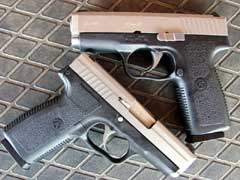
Kahr CW45 (top) and P45 (bottom) 45 ACP
semi-automatic pistols.
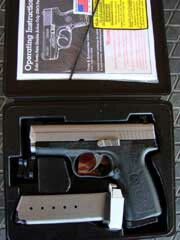
P45 comes with hard case, instructions, trigger lock,
and two magazines.
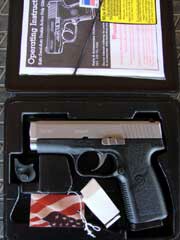
CW45 comes with hard case, instructions, trigger
lock, and one magazine.
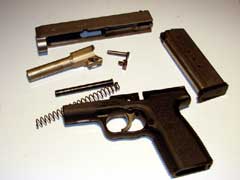
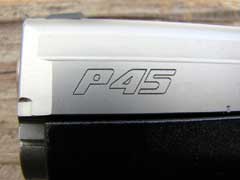
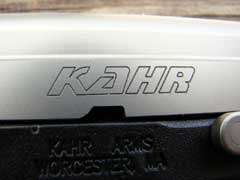
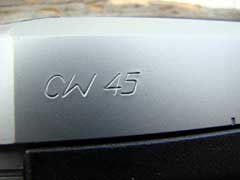

Lettering styles on the slides are different.
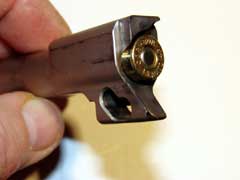
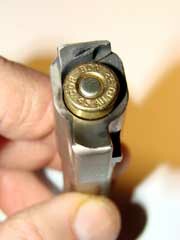
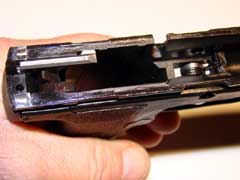

|
|
Kahr Arms has been manufacturing unique and
compact pistols for about eighteen years now. Kahr pistols are
some of the best pistols currently made for the purpose of
concealed carry. Each Kahr is designed around the cartridge to be as slim and
trim as possible, and the Kahr pistols, no matter the caliber,
seem to fit the human hand very well. Even shooters with small
hands can handle the Kahr, and they also feel good in my large
mitts. It seems to
bother some folks that Kahr pistols cost more than some
competitive weapons. However, quality costs money, and Kahr does
not build their pistols to a price point. They build them to be
the best that they can be. Since the first K9 Kahr that I
handled many years ago, I have loved the feel of the Kahr in my
hand. Even their 45 Auto pistols are slim and trim. Kahr now
makes many pistols using polymer frames, which are lighter in
weight, and that seems to be the most popular style of concealed
carry pistols on the market today. Still, some potential buyers
balk at the price of a Kahr 45, so in 2008, Kahr introduced a
lower-priced version of their P45, called the CW45. There is a
substantial price difference between the two pistols, so I
thought that I would compare the two, and see if the P45 was
worth the extra $199 retail price tag.
Externally, both pistols are very much alike.
The external difference that is most notable are the sights. The
P45 has sights that are dovetailed into the slide, while the
front sight on the CW45 is pinned into place. That is not a big
deal, as tritium sights are now
available for both the P45 and the CW45. Also, while the frames
are identical, the slide on the P45 is thinned and radiused at
the top, compared to the more blockish profile of the CW45.
However, for me anyway, the CW is easier to grasp to retract the
slide, as there is almost twice as much serrated area onto which
to get a good hold. Internally, the CW has conventional rifling
in the barrel, while the P45 comes with a Lothar Walther match
grade barrel, so potentially, it might be more accurate, and its
style of rifling might give higher velocities, so we will
chronograph several types of 45 ACP ammunition side by side in
the two pistols. Finally, the P45 comes with two magazines,
while the CW ships with only one. Both pistols use identical six-round magazines, for a loaded
capacity of seven rounds. An extra mag lists for 44 bucks, but CDNN
has them for about ten dollars less.
The magazine difference whittles the price difference
down to about $164, which is still quite a bit of difference in
price between the two pistols. For some, that amount of money is
no big deal, but for others, it would mean the difference
between buying a Kahr, or settling for another brand. What I
plan to do here (and I wrote this introduction before firing
either of the two pistols), is to determine if the CW45 is a
lesser pistol than the P45. From the factory, the P45 is
available with more options, such as factory-installed night
sights and a black slide, but those are extra cost options, so
here, we will stick with comparing these two very similar
pistols, and see just what, if anything, we give up by saving
that hundred and sixty-four bucks. Therefore, I am going into
this with an open mind, knowing that both are quality pistols,
to determine if the CW45 can hold its own with the P45.
Critical
specifications are listed in the chart below. Weights are listed
in ounces. Linear measurements are listed in inches. Trigger
pulls are listed as pounds of pressure.
Height includes sights and magazine base.
| |
P45 |
CW45 |
| Chambering |
45 ACP |
45 ACP |
| Weight
with empty magazine |
20.7 oz. |
21.8 oz. |
| Trigger Pull |
5.1 lbs. |
5.0 lbs. |
| Barrel Length |
3.64" |
3.64" |
| Barrel Diameter |
0.578" |
0.578" |
| Rifling |
Polygonal RH 1 in 16.38" |
Conventional RH 1 in 16.38" |
| Overall Height |
5.3" |
5.3" |
| Overall Length |
6.32" |
6.32" |
| Slide Thickness |
1.00" |
1.00" |
| Grip Thickness |
1.06" |
1.06" |
| Trigger Reach |
2.47" |
2.47" |
| Magazine Capacity |
6 rounds |
6 rounds |
| Magazines Supplied |
2 |
1 |
I tested for velocity with my chronograph set
at a distance of twelve feet from the muzzle, and an air
temperature of twenty-one degrees Fahrenheit. Velocity readings
were taken at an elevation of approximately 541 feet above sea
level. Velocities
are listed in the chart below, and are listed in feet-per-second
(fps). FMJ is a full metal jacket bullet. JHP is a jacketed
hollowpoint. DPX is an homogenous copper hollowpoint bullet.
Glaser is a specialty pre-fragmented bullet inside a copper
alloy jacket. PB is Pow’RBall. EPR
and AF are high performance specialty bullets as loaded by Extreme
Shock Ammunition. LWSC is a cast lead semi-wadcutter bullet.
Bullet weights are listed in grains.
| Ammunition |
Bullet Weight |
Velocity P45 |
Velocity CW45 |
| Cor-Bon JHP |
200 |
961 |
983 |
| Cor-Bon JHP |
165 |
1122 |
1129 |
| Cor-Bon JHP |
230 |
856 |
869 |
| Cor-Bon DPX |
185 |
1001 |
1007 |
| Cor-Bon PB |
165 |
1167 |
1171 |
| Cor-Bon Glaser |
145 |
1263 |
1295 |
| Stryker FMJ |
230 |
737 |
720 |
| Buffalo Bore JHP |
230 |
849 |
855 |
| Buffalo Bore FMJ |
230 |
851 |
876 |
| Handload LSWC |
200 |
945 |
953 |
| Extreme Shock EPR |
185 |
1134 |
1146 |
| Extreme Shock AF |
125 |
1374 |
1377 |
| WCC 1911 Ball FMJ |
230 |
767 |
787 |
Accuracy testing was done with the pistols
rested hand-held on a Target
Shooting Model 1500 pistol rest, at a distance of
twenty-five yards. I fired one pistol, then the other, using the same brand and
lot of ammo, from the same box, to be as consistent as possible
in my comparison of the accuracy of these two pistols. At this
point, I will comment about the trigger on these Kahr pistols.
The trigger pulls are delightfully smooth and light on both of
these pistols, with pull weights measuring approximately five
pounds, and again, they are as smooth as is mechanically
possible. The slide pre-cocks the striker, then the trigger
finishes cocking and releases the sear. Trigger travel is about
three-eighths of an inch at the center of the trigger. The
excellent trigger pulls make these Kahr pistols easier to shoot
well than many competitive pistols.
Accuracy varied from the best with the Buffalo Bore 230
grain flat point full metal jacket which grouped under two
inches at twenty-five yards, repeatedly, from both pistols. The
handload did almost as well, with the other loads tested coming
in between two and three and one-half inches at twenty-five
yards. After firing many groups from the bench, I could not say
that either of these pistols is any more accurate than the
other. As can be seen in the chart above, velocities were also
very close. I had expected that the polygonal rifling of the P45
would give slightly higher velocities, but the converse was true
in this case, with the CW45 posting slightly higher velocities
with almost every load tested.
Reliability was very good. Every load tried
fed, fired, and ejected, but in the P45, I had trouble with the
Buffalo Bore 230 grain ammo, as the slide would not go into
battery without a nudge at the rear. The Buffalo Bore functioned
perfectly in the CW45, so it appears that this particular P45
might have a tighter chamber than this CW45. This just proves
that with ANY weapon that is to be carried for serious purposes,
the chosen ammo should be thoroughly tested before carrying. All
other ammo functioned flawlessly through the two Kahr pistols.
These two pistols are very close in all respects, with
the P45 being 1.1 ounces lighter in weight on my scale, due to
the machining of the slide.
However, that is not enough weight to make a difference
to me, and I am of the opinion that choosing between these two
pistols, I would definitely go with the lower-priced CW45. It is
every bit as smooth, as accurate, and as reliable as the more
expensive P45, and it is still a Kahr. The difference in price
would buy a good set of tritium night sights, a box of ammo,
and two extra magazines.
Check out the entire line of Kahr pistols and
accessories at www.kahr.com.
For the location of a Kahr dealer near you,
click on the DEALER LOCATOR at www.lipseys.com.
To order either the P45 or CW45 online, go to
www.galleryofguns.com.
Jeff Quinn
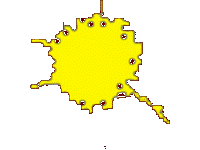  
Got something to say about this article?
Want to agree (or disagree) with it? Click the following link to
go to the GUNBlast Feedback Page.
|
|
Click pictures for a larger version.

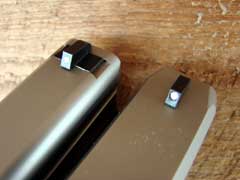

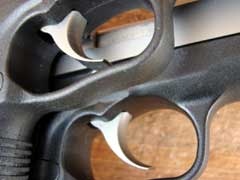
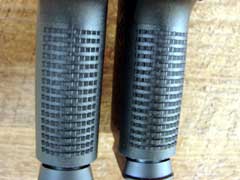
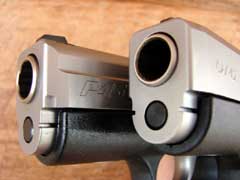
P45 (left), CW45 (right).

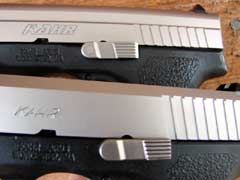
P45 (top), CW45 (bottom).
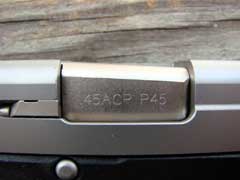
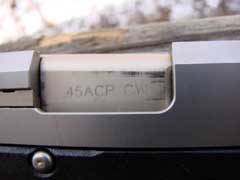
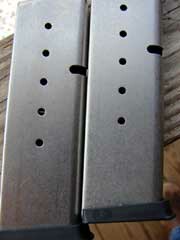
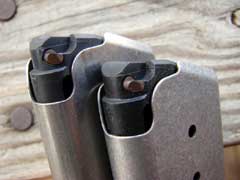
P45 and CW45 magazines are identical.
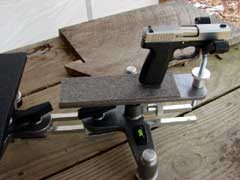
Accuracy testing was done with the aid of the Target
Shooting, Inc. Model 1500 pistol rest.
|
![]()